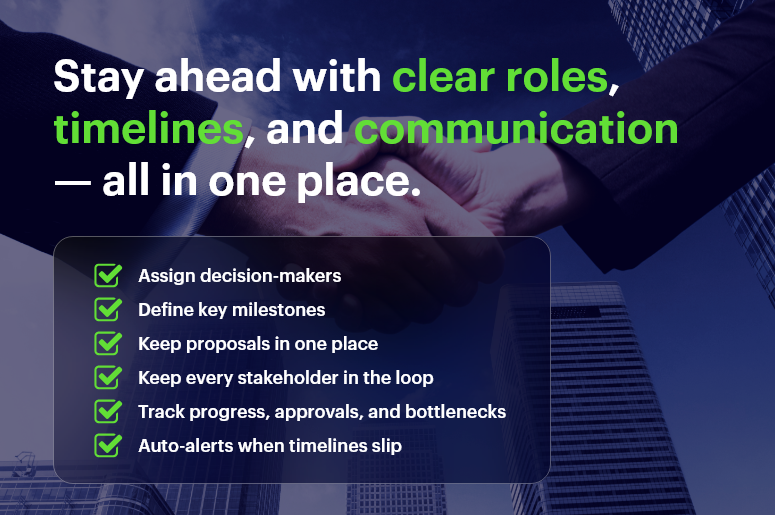Did you know that enterprise deals involving five or more stakeholders are 50% more likely to stall? The reason: misalignment, siloed communication, and lack of coordination.
Big deals bring big rewards — but also big risks. When departments like finance, procurement, operations, and IT all weigh in, a single misstep can delay months of effort.
That’s where CRM for managing large deals comes in.
This post reveals how structured stakeholder management, unified deal communication, and KPI-driven tracking can help close complex deals faster. Plus, you’ll see how CRMLeaf’s CRM + ERP makes it all seamless.

Why Large Deals Need a Strategic Approach
Managing large deals isn’t just a sales task—it’s a company-wide initiative. You need more than a pitch deck. You need structure.
Let’s break down the key challenges:
- Longer sales cycles: More stakeholders mean more reviews, delaying decisions.
- Siloed communication: Teams use separate tools. Key info gets lost.
- Misalignment risk: Without goal alignment, deals fall apart.
- Complex value analysis: Legal, tax, and finance each assess deals differently.
These issues affect every industry:
- Healthcare: Input from physicians, legal, IT, and procurement.
- Manufacturing: Collaboration between engineering and supply chain.
- SaaS/Tech: Multi-department integrations, security reviews, ROI analysis.
With CRM for managing large deals, businesses can simplify the chaos.
Why CRM + ERP Matters in Large Deal Management
Here’s how a CRM for managing large deals transforms your process:
- Clear roles and responsibilities
- Unified communication across teams
- Transparent, real-time progress tracking
- Centralized documentation and version control
Instead of relying on scattered emails or disconnected tools, a unified CRM + ERP like CRMLeaf brings every stakeholder into one system — keeping complex deals on track.
Best Practices: Using CRM for Managing Large Deals
1. Map Stakeholders from Day One
Start by identifying all decision-makers: finance, IT, legal, procurement, and executive sponsors. Know their priorities, timelines, and common objections.
Assign a Deal Champion for each group to streamline communication.
CRMLeaf lets you tag stakeholders, route tasks, and track updates—automatically.
2. Build a Milestone-Driven Deal Timeline
Break the process into clear stages:
- Discovery
- Proposal
- Legal Review
- Technical Evaluation
- Final Negotiation
- Closure
Assign deadlines and visualize progress with Kanban or waterfall views.
CRMLeaf’s deal pipeline shows real-time status—helping you flag blockers before they cause delays.
3. Centralize Communication for All Stakeholders
Create a shared workspace with:
- Dedicated chat threads
- File sharing
- Message history
Set a weekly cadence for updates and allow external visibility (e.g., legal or finance consultants).
CRMLeaf’s collaboration module keeps all communications tied to the deal record—with automatic alerts.
4. Store Documents in a Central Library
No more lost attachments or outdated versions. Create folders for:
- Proposals
- Contracts
- SOWs
- Compliance files
Tag files with role-based access (e.g., finance vs legal) and maintain audit trails.
CRMLeaf provides version control and stakeholder-specific permissions.
5. Track Deal KPIs in Real Time
Set your KPIs early:
- Decision dates
- Approval deadlines
- Budget alignment
- Contract terms
Automate progress tracking with dashboards. Set alerts for delays to prevent slippage.
CRMLeaf’s CRM for managing large deals makes KPI visibility instant and actionable.
6. Define Escalation Protocols
Don’t wait for a problem to react. Pre-plan your escalation path by role and deal phase.
Use:
- Pre-set email templates
- Approval workflows
- 48-hour inactivity triggers
CRMLeaf automates escalations. For example, if finance delays an approval, the CFO is alerted.
Case Study: Apex Construction Supply
Challenge: Apex — a mid-sized manufacturer — was closing a $2M global contract involving six departments. The deal stalled for 60+ days due to document confusion and missed approvals.
Solution: Using CRMLeaf’s CRM for managing large deals, Apex:
- Built a stakeholder map
- Assigned automated tasks
- Used shared workspaces for file sharing and version control
- Tracked KPIs via dashboards
- Triggered automatic reminders and escalations
Result: Deal closed in 30 days — a 50% reduction in cycle time. Compliance was smooth, departments trusted the process, and revenue was recognized early.
Key Takeaways
Large enterprise deals don’t have to be messy. With a strategic approach, the right CRM tools, and cross-functional alignment, you can reduce delays and close faster.
Here’s what you need to succeed:
- Map stakeholders early
- Build timelines with deadlines
- Centralize documents and communication
- Track KPIs with dashboards
- Plan and automate escalation workflows
CRMLeaf’s CRM + ERP simplifies managing large deals from start to finish — so your team stays focused and your deals stay on course.

